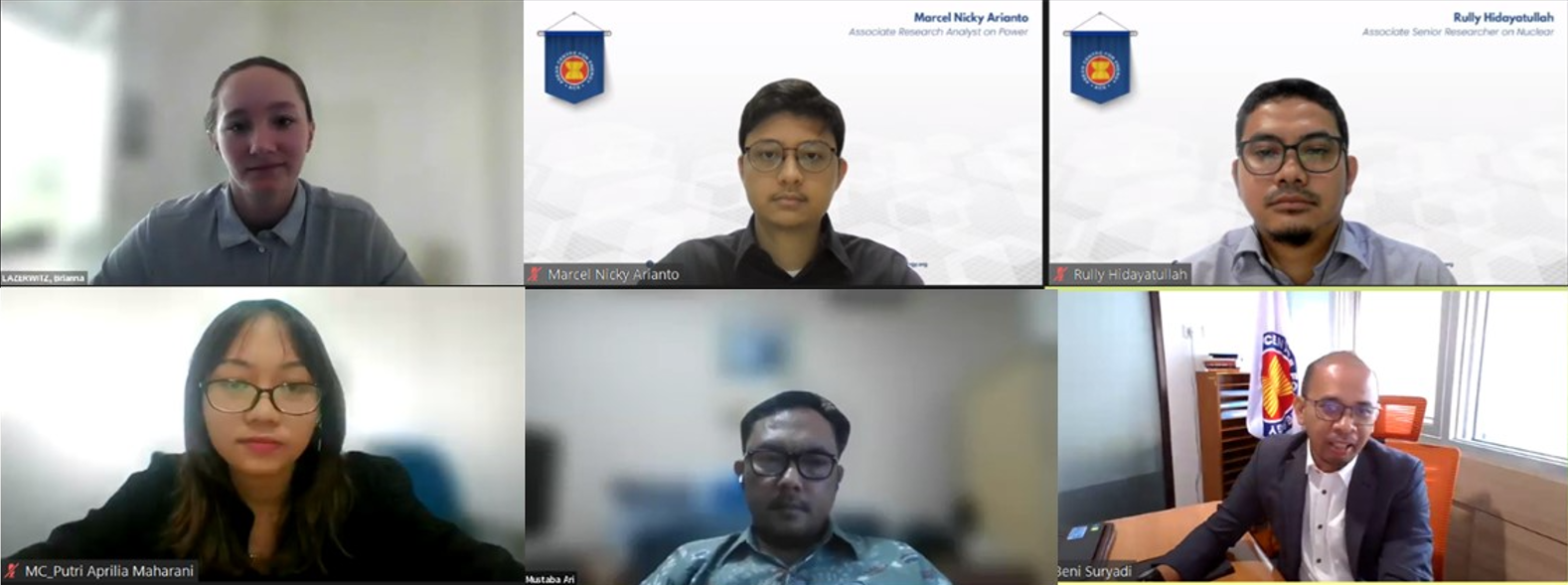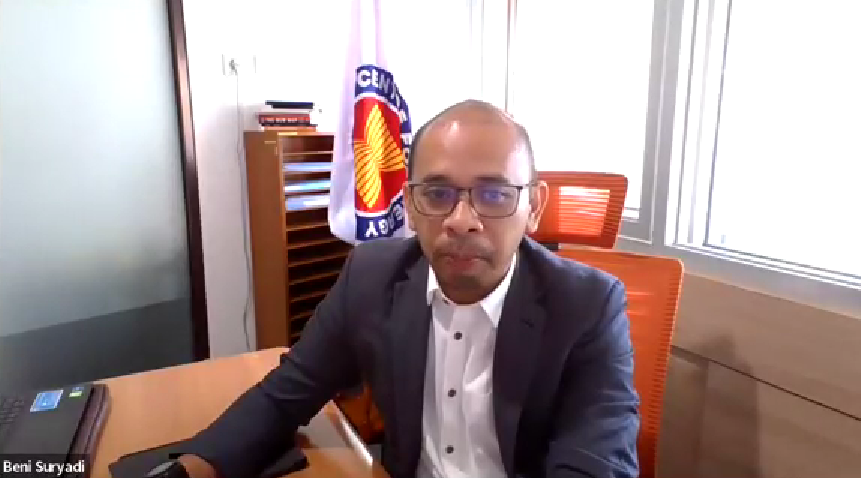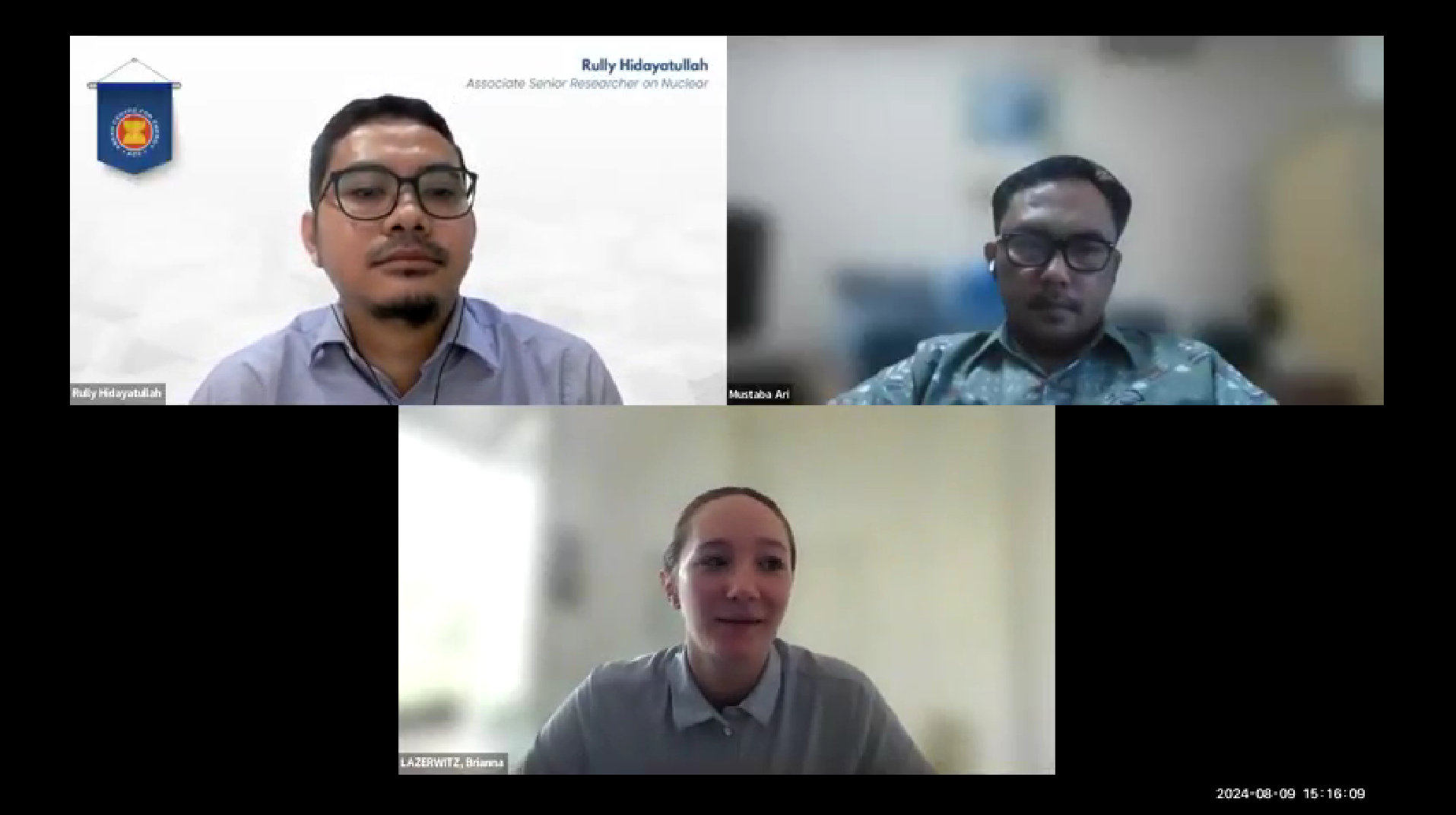Menu

Photo 1. Webinar of ASEAN Energy Booklet Volume 2 panellists and organisers group photo
The ASEAN Centre for Energy (ACE) hosted a webinar to launch the ASEAN Energy Booklet Volume 2: Nuclear Energy Development in ASEAN on 9 August 2024. The event attracted over 100 participants, including policymakers and technology experts from the Ministry of Energy and Mineral Resources (MEMR) of Indonesia, International Atomic Energy Agency (IAEA) who gathered to discuss the current situation and future trajectory of nuclear energy within the ASEAN region.
As ASEAN’s energy demand continues to rise amid the inevitable increase in fossil fuel consumption, the region is at a critical juncture, seeking alternative energy sources to sustain its growth and enhance regional energy security. While nuclear energy has been a cornerstone of electricity generation in many developed nations, ASEAN has set its sights on integrating nuclear energy by 2030 and beyond. In preparation for this shift, the region has been laying the groundwork through the Civilian Nuclear Energy (CNE) programme area under the ASEAN Plan of Action on Energy Cooperation (APAEC) Phase II: 2021-2025, improving nuclear energy literacy and public engagement (Outcome-based Strategy 1) is seen as a way for the ASEAN region to prepare for the imminent utilisation of nuclear energy.
In response, ACE has launched the ASEAN Energy Booklet, with the purpose of providing accessible and easy-to-digest information for assisting the ASEAN Member States’ clean energy policy-making process, provide a comprehensive update on the current status of nuclear energy development within the ASEAN region, comprising of the current technological advancements in nuclear technology, nuclear development plans of each country, as well as the technical, regulatory, and social challenges in implementing nuclear energy. The Nuclear booklet presents an overview of nuclear technology and its inherent potential in ASEAN, updates on the current state of nuclear technology and development within ASEAN, explores merging opportunities, and outlines the path forward for nuclear in the region.

Photo 2. Opening remarks by Beni Suryadi, Deputy Executive Director of ACE
The event commenced with the opening remarks from Beni Suryadi, Deputy Executive of ACE, stressed the growing energy demands within the ASEAN region and finding reliable, sustainable solutions is more crucial than ever. He highlighted nuclear energy as a key option, stating, “Nuclear energy, with its potential to deliver consistent and low-carbon power, is a topic that the region can’t afford to overlook” this addresses the importance of integrating nuclear power into the region’s strategic energy discussions as a viable path forward.

Photo 3. Presentation by Marcel Nicky Arianto, Associate Research Analyst on Power at ACE
Marcel Nicky Arianto, Associate Research Analyst on Power at ACE, digests information regarding several technological developments in energy sector in ASEAN and discusses the content of the booklet. Nicky presented the advantages of nuclear technology in the future and highlighting the nuclear development process from the ASEAN Member States (AMS), the status of the AMS nuclear energy policy, challenges, key drivers, and future directions in the nuclear energy implementation within ASEAN. In order to fully develop nuclear energy, Nicky emphasises the critical importance to establish legal and regulatory frameworks for nuclear safety, increase nuclear literacy, establish nuclear energy planning coordination and integrate enabling policies and regulations on nuclear power.

Photo 4. (left- right) Presentation by Mustaba Ari from the Ministry of Energy and Mineral Resources (MEMR) Indonesia and Brianna Lazerwitz from the International Atomic Energy Agency (IAEA)
The event proceeds with a presentation from international and nation’s energy experts update on country’s progress in nuclear energy development and critical nature of financing schemes in emerging markets for nuclear projects. Mustaba Ari, Planning Coordinator for Various New and Renewable Energy of MEMR, Indonesia, provides an explanation of Indonesia’s policymakers’ perspective on nuclear technologies, spearheaded the groundwork of Nuclear Energy Program Implementation Organization (NEPIO) as the nation’s nuclear energy initiatives. Brianna Lazerwitz, Analyst on Energy, Economics, and Climate of International Atomic Energy Agency (IAEA) presents an in-depth overview of Climate Change and Nuclear Power in 2024 explored various funding mechanisms, including green taxonomy and the unique characteristic of nuclear projects. Brianna addresses the key strategies to navigate the capital-intensive in achieving net zero emissions by 2050 with the development of small modular reactors (SMRs), which offer a pathway to reducing initial costs and mitigating construction risks.

Photo 5. Panel discussion moderated by Rully Hidayatullah, Associate Senior Research Analyst on Nuclear at ACE
The session was followed with a panel discussion moderated by Rully Hidayatullah, Associate Senior Research Analyst on Nuclear at ACE. Rully poses insightful questions to Brianna Lazerwitz and Mustaba Ari, focusing on the progress and challenges in nuclear energy financing and potential sites for nuclear power plants in Indonesia. Brianna suggested the engagement within multilateral development banks and key financial institutions, consider dividing nuclear projects into smaller and more manageable phases, and encourage the involvement of large energy users, such as industrial manufactures in nuclear projects. Ari also address an ongoing study to identify and assess potential sites for nuclear power plants in Indonesia, develop a roadmap that align with Indonesia’s broader goals for energy security, and to accelerate the development of regulatory frameworks that support the deployment of nuclear energy. Rully concluded the session with three (3) main highlights: nuclear energy as one of living option and being considered in the long-term energy planning by the ASEAN member states, nature of the nuclear project financing and how to minimise risk associated with the project, and to explore and raise awareness of the nuclear energy projects as an ESG (Environmental, Social, and Governance) investable asset.
Rully, ended the seminar with a wrap-up and way forward, express his gratitude to the panellists and participants, and conveyed that the insights from this booklet and forthcoming studies would offer a valuable analysis to develop a cleaner policies and regulations and emphasises the importance of continued collaborative approach towards a low-carbon future to support the development of nuclear energy across the region.
